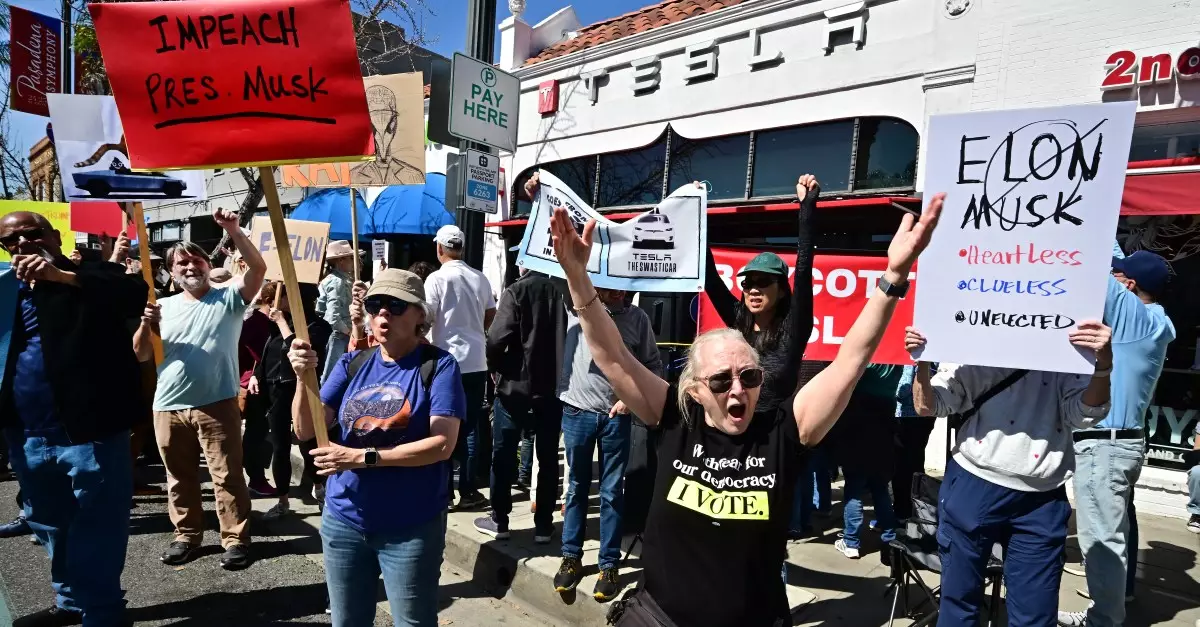In an unprecedented display of collective outrage, organizers have declared March 29th as the day for a monumental wave of protests at Tesla locations worldwide. This initiative is aimed at facilitating 500 demonstrations across all 277 Tesla showrooms and numerous Supercharger stations. Initially starting as a small gathering at select locations in February, the movement has significantly ballooned in scale, fueled by growing dissatisfaction with the leadership of CEO Elon Musk. As the protests gain momentum, it has raised critical questions about corporate governance, accountability, and the power of public dissent in influencing corporate behavior.
The crux of the protests lies in Musk’s controversial actions, particularly his decisions to dismantle federal programs that support employees and bolster government efficiency, now ironically led by the rebranded “Department of Government Efficiency” (DOGE). These measures have not only incited anger from Tesla employees but also attracted global attention from concerned citizens. As they rally with signs and chants, protesters have emerged as a symbol of resistance against perceived authoritarianism and corporate governance gone awry.
The Unfolding Narrative of Dissent
While the protests have been largely peaceful, they have coincided with a distressing uptick in acts of vandalism and violence against Tesla showrooms. Though not directly connected to the demonstrations, these incidents have caught the ire of Musk and have drawn severe rhetoric from figures in the Trump administration, branding dissenters as “domestic terrorists.” Such labels fuel the need for regulations designed to suppress public protests, turning the landscape of civil protection into a battleground for rights and freedoms.
Protest organizers have been vocal in asserting their conviction that the struggle is one that encompasses much more than mere dissent against Tesla. As articulated by prominent figures in the movement, including actress Alex Winter and activist Alice Hu, their fight represents a broader battle for democracy and accountability, one that transcends the company and touches on the very fabric of American values. Hu’s adamant call for a substantial turnout serves as a rallying cry against the perceived injustices perpetrated by Musk and those aligned with him.
A Divisive Leader in Troubling Waters
Given the staggering 40% drop in Tesla’s stock price in recent months, many believe that this movement has been invigorated by growing fears of the company’s future. Analysts and activists assert that targeting the company’s financial viability could be an effective strategy for forcing Musk to confront the ramifications of his actions. Investigative journalist Micah Lee has raised the stakes, suggesting that crippling Tesla could ultimately force Musk to divest from stocks to cover his substantial debts incurred from ventures like Twitter.
Underlying these financial pressures is the realization that Musk’s position as the richest individual globally relies heavily on Tesla’s stock price. Currently, he controls a striking 13% of the company, but the volatility of its market value is a reflection of broader anxieties regarding the organization’s direction under Musk’s leadership. A recent report indicating that Tesla’s market cap has plummeted from $1.08 trillion to $739 billion underscores the urgency for systemic change, and activists are seizing on this moment to mobilize significant grassroots resistance.
The Interplay Between Protest and Governance
The consequences for these protests are not strictly confined to corporate consequences; they have potential legal implications that could put demonstrators at risk of severe penalties, particularly in stricter states. Activists like Lauren Regan advocate for increased knowledge about local laws to navigate the complex landscape of protest rights, as attempts by authorities to arrest dissenters often aim to stifle broader political dialogue.
In an era where information dissemination and political discourse are heavily influenced by media narratives, it could be easy for Musk to dismiss these protests as mere noise, particularly when he wields considerable power within federal government circles. Experts like Joan Donovan posit that Musk’s narrative could be waywardly disconnected from significant public sentiment, painting a picture of a leader indulged by power and influence while the public grapples with critical issues.
A Cultural Moment Against Corporate Autocracy
This unfolding drama puts a fine point on the growing tension between corporate leadership and public accountability. As millions watch from the sidelines, the protests serve not just as a statement against Tesla, but as a visceral reminder of the darker implications of corporate governance unfettered by checks and balances. The aims of the demonstrators reflect an urgent hunger for justice and accountability, capturing the zeitgeist of a population that is increasingly aware of the stakes involved in corporate democracy.
It’s a striking moment of cultural reckoning—a poignant reminder that the stakes of protest extend beyond mere grievances, touching on our collective social evolution. The world is witnessing an awakening in the form of organized, peaceful resistance that seeks to redefine the metrics of power, in hopes of fostering a future where leadership serves the public good and not just corporate interests.

